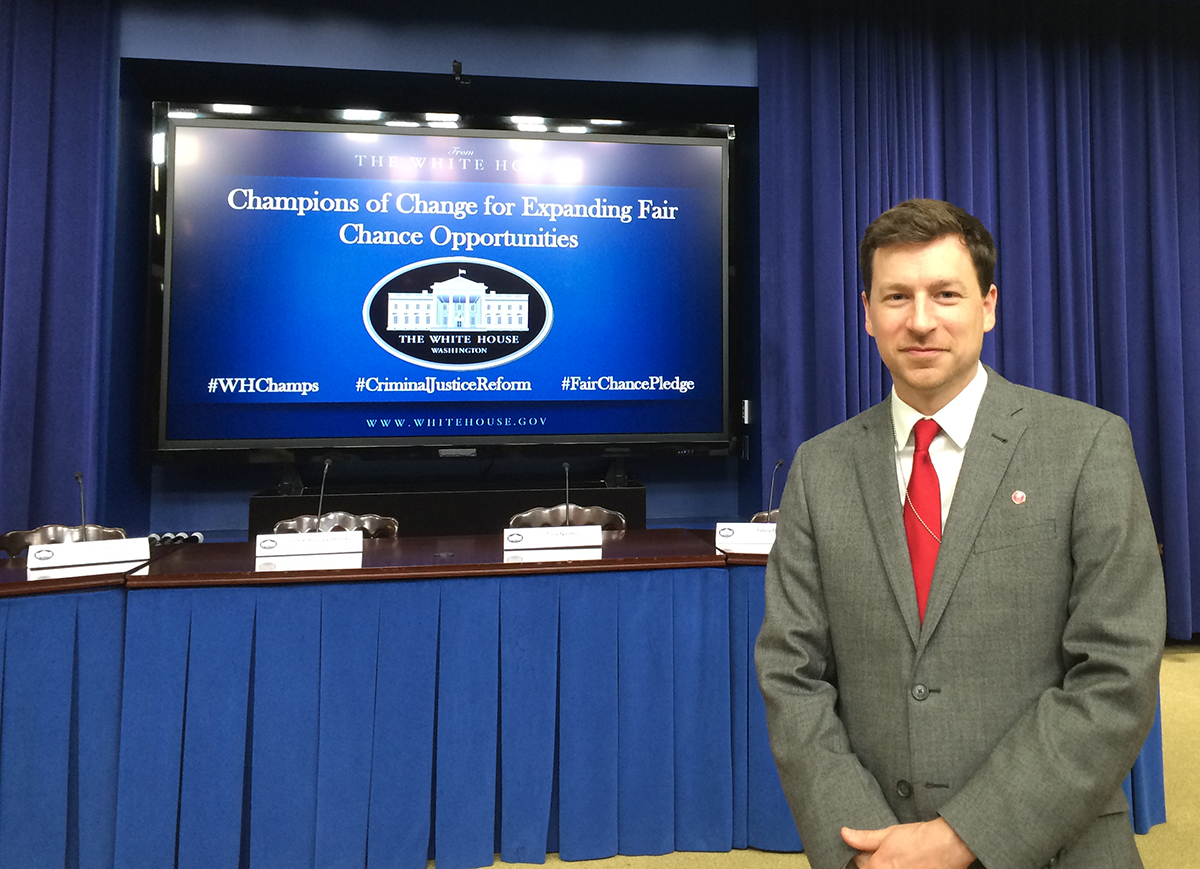White House names prison educator a Champion of Change
By Susan Kelley

Rob Scott, executive director of the Cornell Prison Education Program (CPEP), was honored April 27 as a Champion of Change by the White House for giving prison inmates a fair chance at earning a college degree.
He was recognized at an afternoon ceremony at the White House, along with nine others from around the country who have expanded opportunities for currently or formerly incarcerated people.
CPEP supports a regional collaboration that brings together Cornell faculty and graduate students who teach college-level liberal arts classes to a select group of inmates at three area prisons. Successful students are conferred an associate’s degree from Cayuga Community College, one of CPEP’s partners. So far 30 CPEP students have earned associates degrees.
“I’m humbled to receive this honor as the director, but I really do think of CPEP as a community, and our work is a community effort,” Scott said.
The incarcerated students navigate the travails of the prison environment to attend the scarce college courses, while graduate students on campus spend hours organizing car pools and going through security clearance procedures to get inside, he said. “And our professors put aside nights in the middle of their work week to drive out to a prison sometimes through blizzards in the middle of November. That’s what has made our program this magical thing,” Scott said.
Each semester about 60 Cornell professors and graduate and undergraduate students teach classes including neuroscience, philosophy, music theory and algebra. Fifteen of the 165 students currently enrolled in the program are on track to graduate this year.
In fall 2015 CPEP won a $1 million grant from the Andrew W. Mellon Foundation to expand its classes and degree programs in two prisons to four, establish a consortium of regional colleges and universities participating in prison education, and create a model college-in-prison network in the region. In 2017, classes will begin at the fourth prison, in Elmira, New York.
The biggest benefit of a college degree is it gives a formerly incarcerated person a shot at participating in the legitimate economy, Scott said. “Without college, they’re going to be returned to the streets with no money in their pocket, no education and the conditioning of a very violent system. That doesn’t help public safety, it doesn’t help reduce crime, and it doesn’t help improve our economy,” he said.
And CPEP provides one of the few pro-social components in what is otherwise a mostly anti-social environment, Scott said. “A college classroom is a place where one can develop adult intellectual skills, the ability to understand that someone who disagrees with you is not necessarily trying to create violence with you,” he said.
Perhaps most important, higher education enables students to reimagine their self-identity, and that transformation often has a ripple effect in the students’ families and communities, Scott said. “The difference between a child saying, ‘My dad is gone’ or ‘My dad is in prison’ and saying, ‘My dad is in college,’ is profound. That child may think, ‘I can go to college. Our family is full of people who go to college.’
“We hear repeatedly from our students that when they talk to their children they’re communicating the value of an education, of participating in society and understanding the structures of how our world works socially, physically, scientifically. It’s at the college level that you start thinking about those things.”
Media Contact
Get Cornell news delivered right to your inbox.
Subscribe